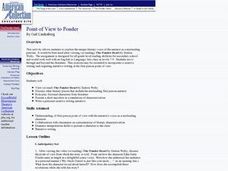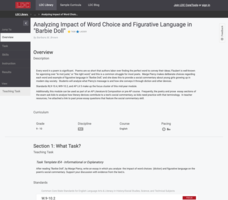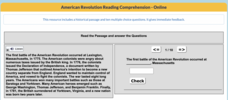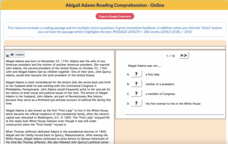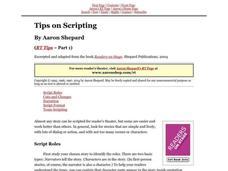Simon & Schuster
Curriculum Guide to: Wuthering Heights by Emily Brontë
Eight lessons and worksheets comprise a curriculum guide for Emily Bronte's Wuthering Heights. Class members create a timeline that includes world-historical events as well as events in the novel. They analyze the speaking styles of...
National Endowment for the Humanities
Literary Genres in “Moby-Dick”
Moby Dick is more than a whale of a tale narrated by Ishmael. A lesson studying Herman Melville's classic novel asks readers to examine the different genres the author weaves into his story. Instructors model how to conduct a stylistic...
Curated OER
Point of View to Ponder
Students view (or read) The Ponder Heart by Eudora Welty. They
discuss other literary pieces that include the misleading first person narrator. They
role play fictional characters from literature and present a short anecdote in a...
Curated OER
What? Did Caesar Swoon?
Students discover the "dumb show," a scene that enacts a story silently while focusing on an example from Hamlet. Divided into groups, they act out the silent scene from the play. Again, in groups, they create a "dumb show" from Julius...
Curated OER
Reading Comprehension- Understanding Poetry
In this poetry reading comprehension worksheet, students examine a poem about charity. They discuss references from the poem, and determine what the narrator has done and how the narrator feels about charity.
Curated OER
What Do You Know About Oceans?
Learners brainstorm and discuss what they know about oceans and seas, read poem My Ocean Speaks by Olga Cossi, discuss narrator's feelings about ocean, write reflective journal entries about their experience or inexperience with the...
Curated OER
Day Six Lesson- The Whale Rider
Students recognize Maori sayings, identify major characters, and discuss major story lines in The Whale Rider. In this The Whale Rider instructional activity, students repeat and define common words of the Maori and discuss the setting...
Curated OER
An American Tragedy: Study Help and Essay Questions
In this An American Tragedy learning exercise, high schoolers analyze plot, symbol, irony, narrator, style, and theme of An American Tragedy by Theodore Dreiser.
Curated OER
Identify Narrative Perspective
In this narrative perspective worksheet, students read short passages and underline, circle or highlight whenthe narrator tells that a character's thoughts or feelings, then determine point of view.
Mythology Teacher
Eros and Psyche: Part 1
With Eros and Psyche, your learners will have the opportunity to combine the art of reader's theater with a study of the ancient Greek gods! This engaging reader's theater script will also serve as a fantastic way for your...
Recorded Books
The Outsiders Lesson Plan
S. E. Hinton's The Outsiders is the anchor text for a how-to primer for using audiobooks in the classroom.
Curated OER
Mississippi Trial, 1955: Imagery Guide
Class members take on the role of jurors in this guided imagery activity designed to be used with chapter 15 of Mississippi Trial, 1955.
Literacy Design Collaborative
Analyzing Impact of Word Choice and Figurative Language in "Barbie Doll"
After a close reading Marge Piercy's poem "Barbie Doll," class members craft an AP®-style explanatory essay in which they analyze the diction and other figurative literary devices the poet employs to deliver her commentary on modern...
Flipped Math
Calculus AB/BC - Selecting Procedures for Determining Limits
Knowing more strategies is always a plus. Pupils watch an engaging video to learn additional ways to algebraically determine the limit of a function at a specified value. The video covers multiplying radical expressions by their...
Flipped Math
Calculus AB/BC - Differentiating Inverse Trigonometric Functions
Differentiating inverse trigonometric functions is quite different from applying the skill inverse functions. Scholars learn how to differentiate inverse trigonometric functions in the fourth of seven video installments in Unit 3 -...
Flipped Math
Calculus AB/BC - L'Hopital's Rule
Direct substitution fails. Now what? The seventh of eight videos in Unit 4 - Contextual Applications looks at L'Hopital's rule. Scholars learn to take the derivative of both the numerator and denominator of a function when substitution...
EngageNY
Narratives as Theater, Part I: What is Readers Theater?
Discover the exciting world of readers theater! Scholars learn all about the reading strategy, reading a script about American heroes and completing an I Notice/I Wonder chart. Next, pupils participate in readers theater using the...
Flipped Math
Calculus AB/BC - Exploring Types of Discontinuities
Continue one's studies by studying discontinuities. The 11th of 18 lessons in Unit 1 - Limits and Continuity first describes the different types of discontinuities. By watching a video, pupils learn to algebraically determine the...
Mr. Nussbaum
The Color Green
A two-paragraph informative text takes a close look at the color green. Scholars listen to and or read the passage, then answer five multiple-choice questions. A progress report details learners' performance.
Mr. Nussbaum
American Revolution
Test scholar's reading comprehension skills with a practice that challenges pupils to read an informational text about the Amerian Revolution then answer 10 questions.
Mr. Nussbaum
Abigail Adams
Ten multiple-choice questions follow a short informative reading about Abigail Adams. Feedback appears instantly and ends with a detailed report.
Brak Software, Inc.
Human Japanese Lite HD
Start with the basics of the Japanese language. The app, which is organized into chapters similar to a textbook, is made up of approachable text, which reads like someone calmly talking you through the aspects of the Japanese language,...
Facing History and Ourselves
Why Little Things Are Big
Often our decisions are impacted by a fear of how others see us. That's the big idea in a two-day lesson that asks how false assumptions, how our fear of how others may see us, impact how we act. After watching a video about such a...
Other popular searches
- Point of View Narrator
- Author and Narrator
- Unreliable Narrator
- First Person Narrator
- Identify Narrator
- Identifying the Narrator
- Point of View/narrator
- Omniscient Narrator
- Identify Narrator or Speaker
- Narrators Point of View
- Narrator Mask
- Narrator and Voice


